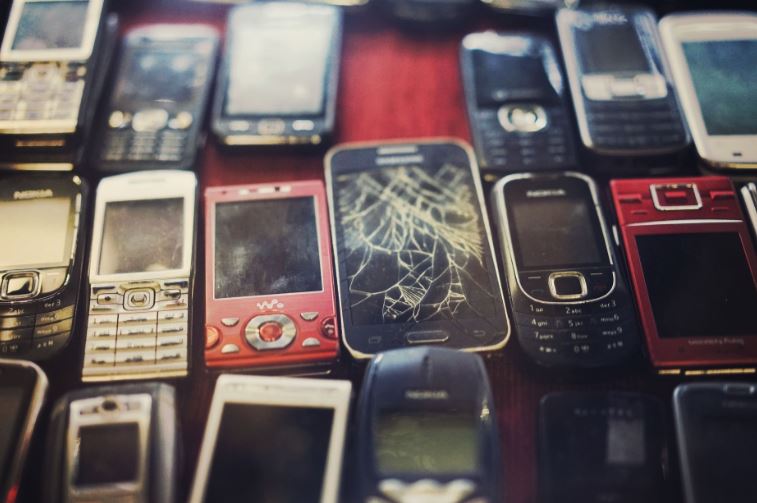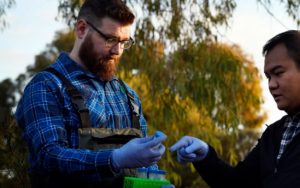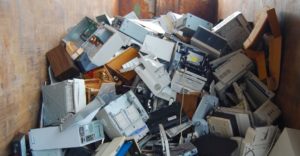
Mounting waste from computers and electronic devices are the focus of a multi-faceted attack on environmental degradation being led by Flinders University and its commercial partner as part of two major new federally funded research projects.

The almost $1.6 million collaboration with Clean Earth Technologies, backed by two major Australian Research Council Linkage Project grants awarded by the Australian Government, will help to establish a pilot printed circuit board recycling plant in Adelaide - and ramp up production of world-leading polysulfide polymers which assist environmental recovery.
The first grant (ARC LP200301660) will expand production of novel polymer technologies for oil spill remediation and slow-release fertilisers developed by the Chalker Laboratory at Flinders University in South Australia.
After small-scale trials, the polysulfide polymers invented by a research team led by organic chemist Associate Professor Justin Chalker, are set to be manufactured in tonne-scale production in Adelaide for customers in Australia and overseas.
"Along with taking these key products into further testing and commercial production, the e-waste Linkage Project (LP200301661) is an important step towards developing the first printed circuit board recycling facility in Australia," says Associate Professor Justin Chalker.

"The project will involve the recovery of gold, silver and palladium from e-ewaste and also feature new recycling methods for the plastic and fibreglass in e-waste.
"Our Flinders team will facilitate the commission and operation of the recycling facility."
The invention of several new rubber-like polysulfide materials - themselves made from waste or recycled materials - has attracted Clean Earth Technologies as a partner. Patents for the oil spill remediation and slow-release fertiliser polymers have been assigned to Singapore-based CET.
"These new products have vast applications and the next stage of these projects will involve further trials and development of the polymer to improve its effectiveness in oil spill remediation after a possible disaster," says company CEO Kevin Fell.
"The Flinders-CET team will also build upon the recent field trials for slow-release fertiliser technique, to develop 'tunable' (adjustable) formulations that release nutrients to the plants at the rate they are needed," Mr Fell says.
"The end result will, of course, reduce nutrient runoff from synthetic fertilisers, which is not only wasteful but harmful to the environment."
CET Chief Commercialisation Officer, Mark Fowler, says the principles of waste-product polymer materials being used to soak up or leach toxic substances such as mercury or oil, or even precious materials such as gold and silver, is both positive for the environment and for economic returns.
"We look forward to ramping up our efforts to make a real contribution to supporting vital measures to not only reuse limited resources, but also promote safe and affordable new ways to reduce environmental degradation, in industrial and developing countries around the world," he says.
The work began after Associate Professor Chalker discovered that the same sulphur-canola oil polymer can extract mercury from polluted soil, water and air.
Mercury poisoning occurs primarily in artisan and small-scale gold mining in some of the world's poorest countries.
The Chalker Lab combined sulphur, a by-product of the petroleum industry, with a renewable product canola oil to produce a solid brown rubber, which was also able to soak up or absorb crude oil. Further research has also applied the science to a renewable form of car tyre rubber and bricks for sustainable buildings, with more ideas in the pipeline.
Flinders University Deputy Vice-Chancellor (Research), Professor Robert Saint, says: "I can think of no better example than the work of the Chalker Laboratory in turning outstanding research into new resources that can deliver a cleaner world."
Announcing the latest ARC Linkage Projects, the Minister for Education and Youth Mr Alan Tudge said the funded projects would keep Australia at the forefront of emerging technologies and have "real world" benefits.
For example, the $659,669 grant for the Flinders University e-waste project would help Australia to capitalise on the $80 billion global e-waste industry and recoup some of the $200 million in gold, silver and palladium discarded in e-waste each year.
"I would love to see many of these projects culminate in world-first breakthroughs or new products that change the way we live, work and communicate," Mr Tudge said.






